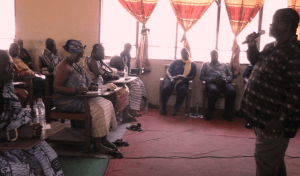Ga South Assembly consults residents on street naming
 Authorities of the Ga South Municipal assembly together with the People’s Dialogue on Human Settlements have organized a public hearing to seek views of opinion leaders and the people in the area for consideration and action.
Authorities of the Ga South Municipal assembly together with the People’s Dialogue on Human Settlements have organized a public hearing to seek views of opinion leaders and the people in the area for consideration and action.
The public hearing which forms part of the local government support programme created the enabling platform for the residents to seek explanation on the street naming exercise and other development projects in the area.
They questioned the authorities on steps taken to fix the bad road networks including bridges and gutters in the locality as well dealing with sanitation and water problems among scores of others.
Mr Immanuel Tettey, Citizen Participation Consultant told the Ghana News Agency that street naming has multiple benefits for national development as it seeks to enhance security, easy identification and increase revenue generation effectiveness and efficiency.
He said it would also help in the national development planning agenda taking into consideration the number of schools and water facilities to provide as well as businesses to be sited in each community.
“Street naming is very important for three reasons; first is security, second, easy identification and third, economic…so the assembly must have address for every house and this will also help us as a country to monitor future progress,” he said.
Mr Tettey, however, noted that the exercise entailed fundamental challenges, citing boundaries between two communities and the fact that there are too many streets in the municipality, which he noted was likely to prolong the early completion of the exercise.
Reacting to issues raised on road projects, The Municipal Chief Executive of Ga South, Mr Jerry Akwei Thompson sai the people needed to honour their tax obligations to facilitate the execution of development projects, saying, “road construction is an expensive project but the assembly has little budget.”
“One kilometer of road cost more than GH¢1 million and our budget is less than that one million,” he said, adding, “we have 172 thousand properties in the municipality but common basic rate of 20 pesewas, people don’t want to pay”.
He questioned, “how long are we going to allow foreigners to determine for us?”
“Failure to pay property rates will land you in court,” he threatened, but assured the people, “we are not going to misuse your money we will account for every pesewa paid to us.”
Mr Thompson accused estate developers of not heeding to laid down procedures regarding land development, thereby creating improper layout, which he said was giving the assembly and the residents problems.
The Municipal Roads Engineer Mr James Quarcoo said the area has 740 kilometre road network out of which 675 are unpaved while only 45 are paved.
The engineer who described the nature of road network in the vicinity as “very very bad,” said, despite that, the assembly’s budget submitted to the road fund for approval was slashed to less than one million cedis.
He said, for instance, due to budget constraints the assembly has stopped carrying out routine maintenance.
Mr Quarcoo explained that the routine maintenance would cost GH₵1,545,179 but the budget approved to the assembly was a paltry GH₵445,000.
He said chunk of the materials used for road construction in the country are imported which is very expensive and therefore called for the use of locally make materials considered to be cheaper.
The stakeholders’ sensitization and consultative workshop on street naming and property addressing exercise attracted large numbers of chiefs and elders from the Ga South Municipal assembly to consider a wide range of issues for redress.
People’s Dialogue, a community-based NGO established in 2003, is part of the implementation agencies executing the Social Public Expenditure and Financial Accountability project in 46 metropolitan and municipal assemblies across the country in three years.
It is the third component of the Local Government Capacity Support Project with the involvement of Ministry of Local Government and Rural Development, Ministry of Finance, and Local Government Service Secretariat.
Source: GNA
